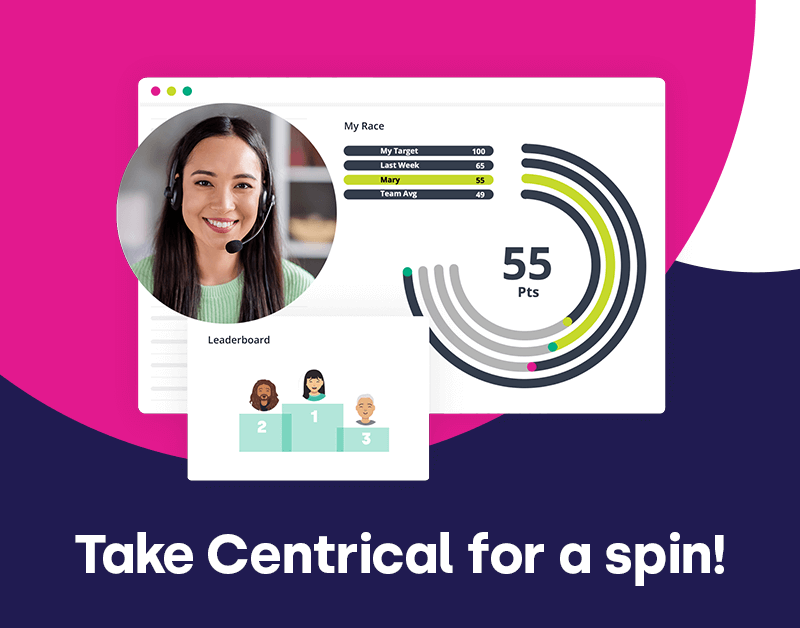What if a small change in your organization could lead to massive improvements when it comes to your key metrics? One area where efficiencies can be leveraged immediately is how to improve call center agent performance. Getting this right has a hugely positive impact on improving customer experience, building brand loyalty and value, and increasing both employee and customer retention.
Of course, this needs to be done efficiently by focusing on specific areas that will have an outsize impact. To help your enterprise optimize call center agent performance, we’ve put together the most effective, actionable steps for how to improve call center agent performance.
How to define an agent’s performance and efficiency in the call center?
Before we jump into the question of how to improve call center agent performance, we need to address how efficiency and success are measured. Judging performance using the correct metric is only half of the battle. Having relevant metrics and ensuring your team is aligned on these, is the first step toward performance and efficiency.
These metrics will differ depending on the nature of the call center and can include:
- Customer satisfaction (CSAT)
- First, call resolution (FCR)
- Average handle time (AHT)
- Average order value
- Average call abandonment rate
- Net Promoter Score® (NPS®)
- Customer retention rate (CRT)
- Average time in queue
While the chosen performance indicator might differ, what all call centers have in common is the need to accurately measure performance to compare progress to the agreed-upon KPIs. In this sense, the words of legendary management guru Peter Drucker ring particularly true: “If you can’t measure it, you can’t manage it.”
Measuring and analyzing performance is the foundation of a high-performing call center. If this process is accurate and transparent, the correct decisions from a leadership perspective can be taken.
First, we’ll address the question of how to improve call center agent performance at the team level. These are steps that can be taken by company leaders to improve the overall call center team’s results. These call center improvement ideas are based on real-life successful call center strategies that are usually part of an overall action plan for call center agents.
Record and monitor calls
When it comes to the conversations that frontline employees are having with customers, organizations might miss the opportunity to truly understand each interaction, and how to improve call quality.
Understanding what’s being said, and analyzing the results of your team’s conversations, helps company leadership understand what’s driving results (both in terms of successes and failures), and in creating a company-wide knowledge base and set of best practices. Recording and monitoring also enable calls to be referenced for coaching and training purposes. Finally, when calls are monitored, this can also prompt agents to go above and beyond.
Take care of the team environment
A toxic team environment can kill any initiative. A happy, motivated team will be receptive to coaching and new ideas and motivated to reach – and exceed – their goals. Conversely, a team where the environment is negative, or even just flat, will be far less likely to perform efficiently.
A positive environment also increases the likelihood of agent retention, engagement, mutual support, and growth.
Review team metrics and make relevant changes
Running with the wrong metrics is not only destructive in terms of business performance, but it also confuses the call center team, drives the wrong behaviors, and rewards incorrect outcomes.
It’s certainly worth revisiting the core key performance indicators (KPIs) that have been set for the team and assessing whether these are indeed the right metrics to be using. Don’t be afraid to change, or course correct; rather, make such pivots as early as possible. Having an action plan for call center agents in place is mission-critical.
An added tip: include the call center team in the decision-making process. This will keep them engaged and driven to achieve these goals, with a clear view of the bigger picture.
Antoine de Saint-Exupéry, author of “The Little Prince” famously said, “If you want to build a ship, don’t drum up the men to gather wood, divide the work, and give orders. Instead, teach them to yearn for the vast and endless sea.” The lesson here is that by providing context and aligning your call center team with overall business goals, you can bring your performance metrics to life and let each team member feel that they are having a direct impact on the performance of the company.
Talk KPIs
Focusing on results is the surest way to achieve success. Instead of having vague goals, ensure you talk about KPIs. These should be easy to understand, relevant, measurable, and concrete. By ensuring that this discussion is ongoing, it also affords all parties the opportunity to intervene or make changes earlier rather than later, if KPIs are not being met.
We also highly recommend having a call center agent performance improvement plan in place, where you can discuss KPI results, both good and bad, to generate learnings and help your team to constantly improve.
Adopt external tools
There are specific tools out there that have been created with the express purpose of improving call center agent performance. The leading tools encompass all the points above, ensuring that company leaders can achieve the performance they are aiming for while empowering call center agents and keeping them engaged.
The Centrical platform provides a robust toolkit for improving call center agent performance by taking a gamified approach to improving performance with personalized, performance-driven microlearning, real-time performance management, AI-powered coaching insights that are both personalized and relevant, and more.
Gamification goes beyond leaderboards by promoting personal progress and creating a positive and supportive environment of friendly competition with individual and team challenges, tapping into intrinsic and extrinsic motivators, and helping to build an engaged and happy call center team.
While the tips we just covered are relevant to the team as a whole, we’ve also added suggestions to improve individual call center agent performance:
Implement feedback calls with a manager
Call center agents require feedback in order to improve, and managers need data to provide relevant and actionable feedback. By ensuring that your organization can offer this, call center agents can be continuously improving – including how to improve call quality – while managers can lead effectively.
Provide new call center agents with scripts
Just giving call center agents a headset and a keyboard and expecting results is not a great strategy. However, supplying call center agents, especially those new to the enterprise, with scripts or talking points will vastly help with agent performance. These materials should be based on both internal and external best practices and actual results and will prove a great way to empower your agents and achieve your KPIs.
Set a clear career path for each agent
Everyone wants career growth and clarity in terms of what needs to be done to achieve this growth, as well as the timelines involved. This means that organizations must invest the time – and use the relevant tools – to create a clear career path for each call center agent, including milestones and timelines.
Create a self-evaluation form
Instead of relying on others to evaluate your call center agents, empower them to evaluate themselves. This helps agents track their progress, push themselves harder, and experience the rush of success.
Key takeaways
Improving call center agent performance, on both an individual and team level, is critical to executing successful call center strategies. The common denominator across these steps is having the right environment and the right tools in place to improve call center agent performance.
With effective and efficient call center agent performance comes increased customer experience and satisfaction; from there will flow the ideal business outcomes that you’re aiming for. Below is a quick summary of tried-and-tested steps that can be taken right now when it comes to how to improve call center team and agent performance:
- Create a positive team environment
- Ensure you’re working toward the right goals and metrics
- Include the voice of the employee in decisions where you can
- Empower and enable agents to own their success and career progression
- Enable regular coaching and feedback discussions on an individual and team level
- Take a gamified approach to performance management and teambuilding
To learn more about taking your frontline team members’ skills and performance to the next level, take a look at the Centrical product preview or book a demo for a personalized consultation.
Engage and motivate your frontline teams
Improve performance with an AI-powered digital coach
Deliver world class CX with dynamic, actionable quality evaluations
Boost performance with personalized, actionable goals
Nurture employee success with the power of AI
Listen and respond to your frontline, continuously
Drive productivity with performance-driven learning that sticks
Drive agent efficiency, deliver client results
Keep tech teams motivated and proficient on products and services while exceeding targets
Maintain compliance while building customer happiness and loyalty
Enlighten energy teams to boost engagement
Engage, develop, and retain your agents while driving better CX
Improve the employee experience for your reservations and service desk agents







 Madeleine Freind
Madeleine Freind
 Natalie Roth
Natalie Roth Linat Mart
Linat Mart












 Doron Neumann
Doron Neumann Gal Rimon
Gal Rimon Daphne Saragosti
Daphne Saragosti Ella Davidson
Ella Davidson Ariel Herman
Ariel Herman Ronen Botzer
Ronen Botzer